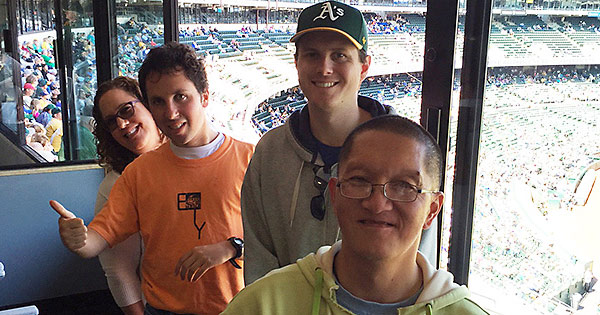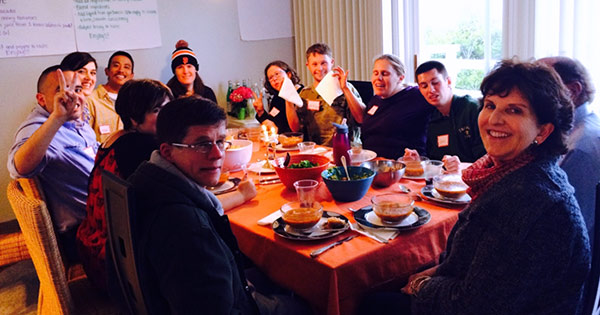- People with Disabilities
For young adults with cognitive and developmental disabilities creating a full and satisfying life means continuing to do the things they love, while also developing new skills. Having aged out of school programs, they and their families will be asking, “What’s next?”
That is where JFCS’ Gary Shupin Independent Living Community and Shupin Social Club come in. JFCS welcomes and envelopes each one. By providing guidance and support they can sculpt the life they want. Whether working full or part-time, volunteering, or heading to vocational school, these young adults are creating lives that are uniquely their own.

Members of Gary Shupin Independent Living Community and Shupin Social Club watch a baseball game at the Oakland Coliseum
Located in San Francisco’s Laurel Village, the Shupin Independent Living Community helps its residents achieve an independent life with the full support of JFCS’ team of Disabilities Service professionals, who provide case management, meal planning and preparation, money management, connections to jobs, and social skills.
On any given day residents might be walking to JCCSF for an art class, taking the city bus to a job-training program downtown, or cooking up a meal in their apartment’s kitchen. Staff work closely with each resident and the family to tailor a care plan, taking into account individual strengths and needs.
Gary Shupin—A Life Well Lived
The namesake of the independent living community, Gary Shupin z’l, lived semi-independently in an apartment in the complex for 18 years until his passing in 2008. Gary, born with cerebral palsy, epilepsy, and developmental disabilities, touched many lives with his incredible love and passion for life. The building was a generous gift from Gary’s family including his late uncle, Gerson Bakar z’l, and mother, Barbara Shupin z’l, who wanted to make sure that others in the community could also find the critical support necessary to help their adult children thrive.
Gerson, a real estate developer and beloved Bay Area philanthropist, knew that Shupin House would be an essential staple in supporting this special young adult community. Before his passing this spring, he said, “Among the many activities that go on at Shupin House are the things that Gary liked that are needed in the community—a place to learn how to cook, a place to learn how to keep house, and a place to have a social life.”
Expanding to Meet the Needs of Isolated Adults with Disabilities
A wider community of young adults with disabilities takes part in a very popular component of JFCS’ Disabilities Services, Shupin Social Club. It offers dynamic and structured activities so participants (from the Shupin residence and the larger community) can socialize, learn, and have fun with their peers.

Shupin Club members share a Shabbat dinner with JFCS’ Executive Director, Dr. Anita Friedman (far right)
Recently the club hosted a bonfire at Ocean Beach and a member who was hesitant to go at first said afterwards, “I was so happy to go. I had never been to a bonfire or even roasted a marshmallow before!”
Weekly activities like cooking classes, going to baseball games, and celebrating Jewish holidays offers a way out of social isolation. In a recent survey of Shupin Social Club participants 85% reported that the club was the only community connection they had in their lives.
“Everyone needs friends and a safe and welcoming place to hang out. The social club is such a vital lifeline for Bay Area young adults with developmental disabilities,” says Nancy Masters, JFCS’ Associate Executive Director, and adds, “It is wonderful to see members meet, get to know each other, and then start to socialize on their own. That’s what life is about—sharing and connecting with people you care about.”
Find out more about JFCS’ Disabilities Services here >
Funding for JFCS’ Disabilities Services is provided by generous individuals and foundations. Special gratitude to the Barbara and Gerson Bakar Endowment Fund, Gerson Bakar z’l, Terry & John Levin/Jay & Rose Phillips Family Foundation of California, Frances & Theodore Geballe/Eucalyptus Foundation, Federation Newhouse Fund, Lana Berke Silverman Endowment Fund, and Barbara Shupin Fund for Independent Living.
To donate to the JFCS’ Disabilities Services, please contact Barbara Farber at [email protected], 415-449-3858, or click here to give online.
